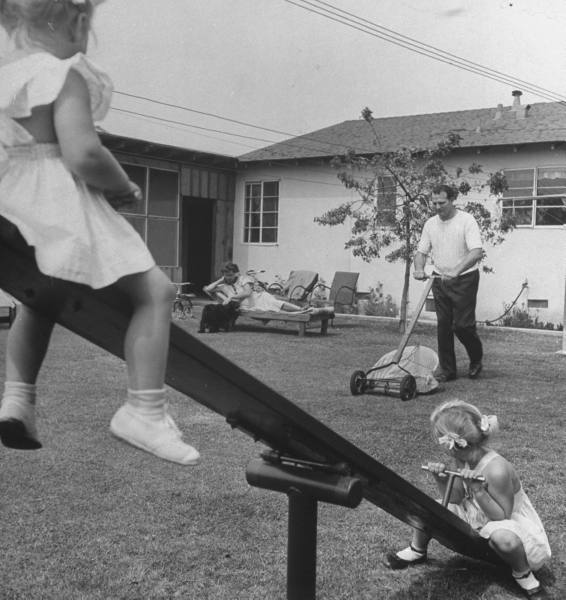
As Father Mows and Grieves for His Lost Youth, Mother's Soul Dies Slowly While Sipping Her Evening Manhattan and Seconal Cocktail. Meanwhile, the Girls Mirthlessly Engage in the Chilly Banality of the Teeter-Totter. Soon, night will come.
David Brooks and I, in a rare alignment of planets, agree on something. Performing his usual trick of writing a book review and piggy-backing on another writer (usually issuing his own spin on the writer’s intentions), he addresses literary darling Jonathan Franzen’s latest book Freedom. In-between the sycophantic flattery to ensure he’s on future guest lists, and chattering about America returning to a uniform spirituality that never happened and which he never sounds like he practices himself, he points out an observation on American letters:
Sometime long ago, a writer by the side of Walden Pond decided that middle-class Americans may seem happy and successful on the outside, but deep down they are leading lives of quiet desperation. This message caught on (it’s flattering to writers and other dissidents), and it became the basis of nearly every depiction of small-town and suburban America since. If you judged by American literature, there are no happy people in the suburbs, and certainly no fulfilled ones.
By now, writers have become trapped in the confines of this orthodoxy. So even a writer as talented as Franzen has apt descriptions of neighborhood cattiness and self-medicating housewives, but ignores anything that might complicate the Quiet Desperation dogma. There’s almost no religion. There’s very little about the world of work and enterprise. There’s an absence of ethnic heritage, military service, technical innovation, scientific research or anything else potentially lofty and ennobling.
It pains me to say it, but Brooks is right. I’ve often wondered about this phenomenon myself. From Sinclair Lewis to Richard Yates to Raygordon Carverlish to Franzen himself, modern writers have portrayed the suburbs as a static purgatory populated by liars, hypocrites, mental cases, drug addicts, adulterers, and people who only seem happy on the surface… BUT WHO ARE NOT. Every suburban town or village in modernist and realist fiction should have a sign standing outside the city limits: “Welcome to ___________: Nobody Wants to Be Here.”
It’s funny that so much of this fiction comes under the heading of realism. While parts are true enough, it is highly unlikely that every person in a town (that isn’t Twin Peaks, which wears its surrealism like a shawl) can be miserable. Hell, let’s go a step further and say it’s patently absurd to leave every member of a modern lit family swimming in a cesspool of existential angst. Hm, I suppose that’s not fair. Authors usually take care to create straw men and women who won’t accept the reality of their and the protagonist’s inner turmoil and woe. But just because it’s fiction, doesn’t mean it has to be unrealistic.
Brooks notoriously paints his pictures with big fat brushes, and his suggestion that the “Quiet Desperation dogma” forbids authors to explore the many outlets humanity has developed to offset feelings of dissatisfaction and ennui is preposterous. Still, from what I’ve read in the New Yorker and New York Times Book Review, it does seem that most modern suburban lit (that accepted as being big L Literature) spins its wheels in the same morass of alcoholism, failed marriage, career disappointment, and so on. These things happen, but they aren’t the only things that happen there. I’d add that I have yet to read an accurate physical portrayal of the suburbs. Most towns sound like they consist entirely of shopping malls and dining rooms.
It requires no stretch of imagination to realize why this is. I think we can make a fair guess that most modern lit is created by those who loathed their comfortably bourgeois upbringing and couldn’t wait to escape to the big city. Speaking as one such individual, I understand perfectly. But the perpetuation of this portrayal of the burbs as a white hell… why it verges on creating a new brand of genre fiction. “Angsty Suburban Fiction? Aisle 3B, between Romance and Mystery. Right after the Humor/Graphic Novels section.”
Post a Comment